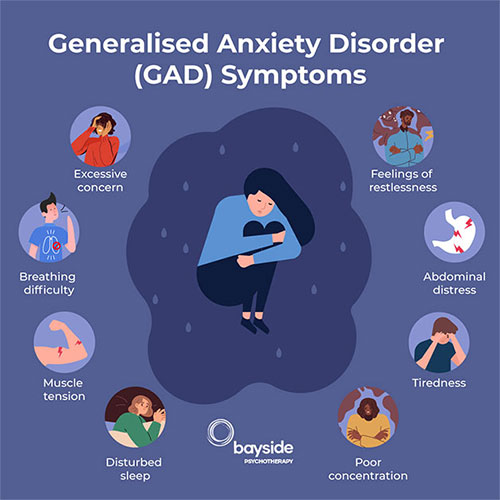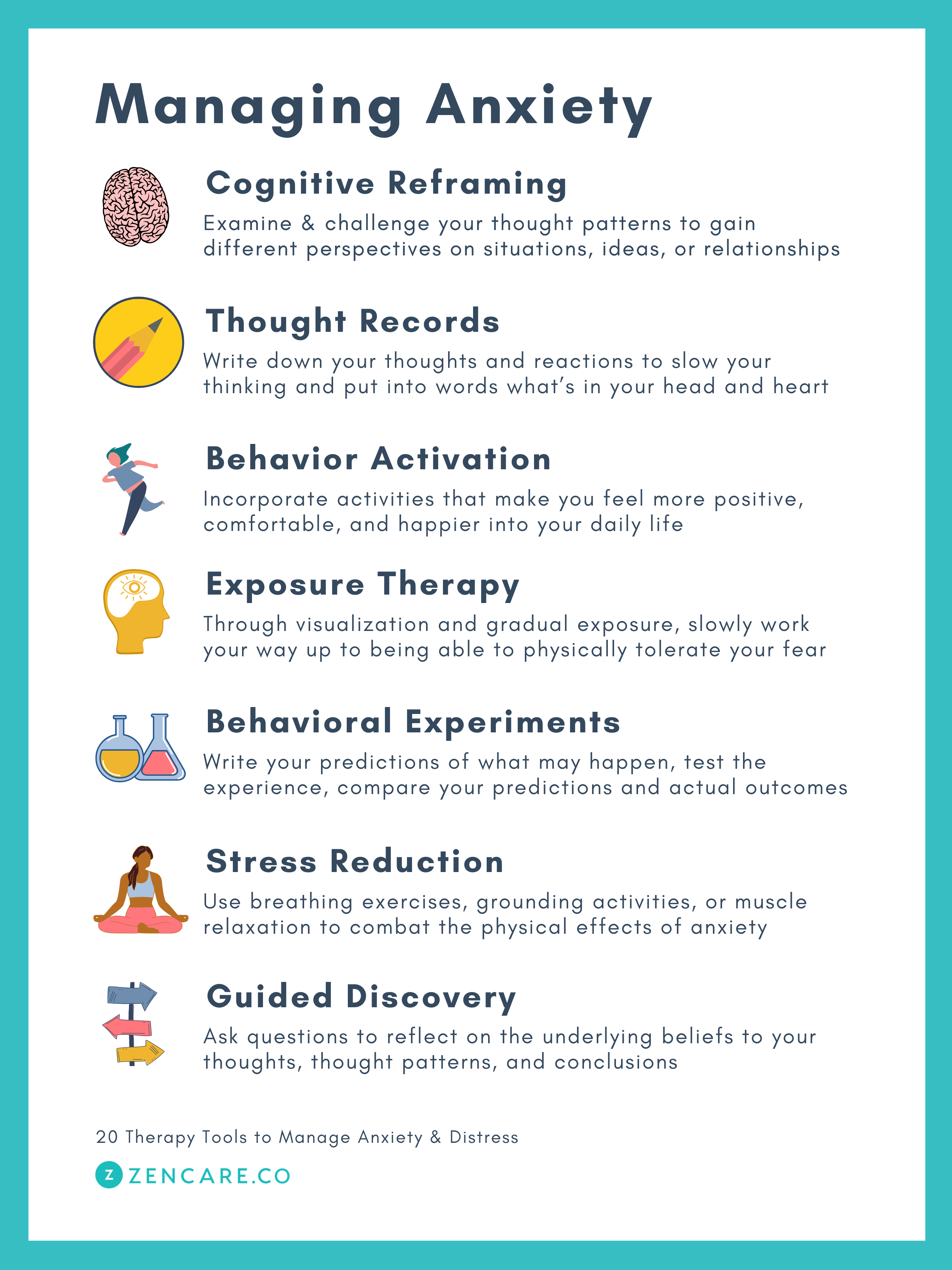Exploring Different Approaches in Counselling for Anxiousness Problem for Enduring Adjustment
When dealing with anxiousness problems, it's important to discover a selection of counseling strategies. Each method offers one-of-a-kind insights and tools to assist you manage your signs successfully. You might discover that incorporating strategies can yield the ideal outcomes. Comprehending the subtleties of these techniques is vital to fostering enduring modification. What happens if the ideal mix could release a new level of emotional well-being for you?
Understanding Anxiety Problems: A Brief Introduction
Anxiety disorders, which affect millions of people worldwide, can greatly affect every day life. You might experience frustrating sensations of worry or stress that appear unmanageable. These sensations can result in physical signs and symptoms like a racing heart, sweating, or also wooziness. Usual sorts of anxiousness conditions include generalized anxiousness disorder, panic disorder, and social anxiety problem. Each has one-of-a-kind indicators, but they all share a tendency to interrupt your routine and relationships.Understanding the origin creates of your anxiousness is important. It may stem from genetics, brain chemistry, or life experiences. Acknowledging your triggers can help you handle your responses better. It's important to keep in mind that you're not the only one in this battle. Many individuals face similar obstacles, and looking for assistance is a strong action toward sensation better. By learning more about stress and anxiety problems, you're already on the path to understanding and managing your problem better.
Cognitive-Behavioral Therapy: Challenging Unfavorable Thought Patterns
In Cognitive-Behavioral Therapy, you'll start by recognizing the adverse idea activates that add to your anxiousness. You'll work on changing them with even more favorable choices when you recognize these thoughts. Together, you'll construct effective coping techniques to assist handle your stress and anxiety in everyday circumstances.
Identifying Negative Idea Triggers

Identifying the details triggers behind your adverse thoughts can be vital in taking care of anxiousness when you run into minutes of distress. Beginning by focusing on circumstances that provoke feelings of concern or worry. Is it a congested room, an approaching deadline, or a discussion with specific people? Write down these circumstances in a journal. This will certainly help you determine patterns in your reasoning. Likewise, notice physical sensations that accompany your adverse ideas, like a racing heart or tightness in your upper body. By pinpointing these triggers, you get insight right into what's fueling your anxiousness. Understanding these links is the initial step in testing those ideas and eventually restoring control over your emotional responses.
Replacing Thoughts With Positives
Testing unfavorable idea patterns is a necessary step in changing your attitude and reducing stress and anxiety. You may commonly find yourself entraped in cycles of insecurity or tragic thinking. Instead of letting these ideas determine your sensations, practice changing them with practical alternatives or favorable affirmations. For instance, when you believe, "I can not manage this," shift it to, "I can handle obstacles one step at once." This easy adjustment can considerably influence your emotional state. Regularly determining and responding to these adverse ideas assists develop a much healthier interior dialogue. Keep in mind, it requires time and initiative, however constantly exercising this strategy can bring about long-term adjustment, encouraging you to face anxiety with renewed confidence and resilience.
Building Coping Strategies With Each Other
Changing unfavorable thoughts is only the start of handling stress and anxiety efficiently. To develop lasting modification, you need to develop coping methods that empower you. Cognitive-Behavioral Therapy (CBT) assists you determine and challenge those unhelpful idea patterns. With each other, you and your therapist can check out exactly how these thoughts influence your sensations and behaviors.Start by establishing useful techniques, like journaling or mindfulness workouts, that enable you to confront stress and anxiety head-on. When you encounter your concerns slowly, you'll discover to respond differently.

Mindfulness and Acceptance-Based Approaches: Cultivating Present-Moment Recognition
As you navigate the intricacies of anxiety, including mindfulness and acceptance-based approaches can substantially enhance your capacity to cultivate present-moment recognition. By concentrating on the below and now, you'll locate that you can observe your thoughts and sensations without judgment (Counseling services for anxiety). This method aids you recognize your anxiety without really feeling bewildered by it.Engaging in mindfulness workouts, such as deep breathing, body scans, or directed reflections, permits you to ground yourself in your current experience. Acceptance-based techniques urge you to welcome your feelings instead of combat against them. They shed their power over you.Incorporating these methods into your everyday routine can transform exactly how you react to anxiety when you accept your feelings. You'll establish resilience and discover to browse demanding scenarios with greater ease. Ultimately, cultivating present-moment recognition lays the structure for enduring adjustment, empowering you to lead a much more fulfilling life
Direct Exposure Treatment: Confronting Worries Slowly
Exposure therapy aids you confront your anxieties in a progressive way, making it less frustrating. You'll find out strategies to deal with anxiety-provoking circumstances step by step, while likewise building coping strategies to handle your responses. This technique encourages you to take control and lower anxiety gradually.
Gradual Exposure Strategies

When facing anxiety, slowly confronting your anxieties can be a powerful way to gain back control. This technique, called progressive exposure, involves gradually exposing on your own to the circumstances or objects that cause your anxiety. Begin with much less intimidating scenarios and progressively work your way as much as even more challenging ones. For example, if you hesitate of public speaking, you could start by speaking before a mirror, then advance to sharing ideas with a good friend, and eventually deal with a tiny team. Each action assists desensitize you to the worry, constructing your self-confidence with time. Remember, it's important to rate on your own and commemorate tiny victories as you move through this process, strengthening your capacity to take care of anxiousness effectively.
Structure Coping Strategies
Building effective coping strategies is necessary for managing stress and anxiety, specifically as you face your worries gradually - Counseling services for anxiety. One powerful technique is direct exposure therapy, where you begin by encountering your fears in a regulated fashion. Start with much less intimidating circumstances and slowly work your way approximately even more challenging situations. This steady direct exposure assists desensitize you to anxiousness sets off, making them less overwhelming.Incorporate leisure strategies, such as deep breathing or mindfulness, to soothe your mind during direct exposure. Track your progress, celebrating small victories in the process to improve your confidence. Keep in mind, it's alright to take your time; the goal isn't perfection but consistent enhancement. By constructing these techniques, you'll encourage yourself to navigate anxiousness and welcome life more totally
Psychodynamic Treatment: Discovering Root Causes of Anxiousness
Psychodynamic treatment explores the unconscious mind, disclosing the root causes of your anxiousness. By examining your thoughts, feelings, and previous experiences, this strategy helps you uncover underlying conflicts and unsettled concerns that this hyperlink might add to your existing anxiousness. You'll work with a specialist to explore childhood years experiences, relationships, and psychological patterns that form your responses today.As you get understanding into these much deeper layers of your subconscious, you'll begin to identify how previous events affect your existing actions. This understanding can cause catharsis, enabling you to process emotions you may have suppressed.Through the healing partnership, you can additionally determine protection devices that might have developed gradually, supplying a clearer path to alter. Eventually, psychodynamic therapy equips you with the tools to resolve your anxiety at its core, promoting long-term improvement in your psychological health.
All Natural and integrative Techniques: Integrating Strategies for Greater Efficacy
Incorporating various restorative methods can boost your journey toward handling stress and anxiety a lot more efficiently. By incorporating components from cognitive-behavioral therapy, mindfulness techniques, and holistic strategies, you can produce a tailored technique that resolves your distinct requirements. You might use cognitive-behavioral techniques to test unfavorable thought patterns while integrating mindfulness workouts to ground on your own in the present moment.Additionally, checking out holistic techniques such as yoga exercise or meditation can promote leisure and decrease stress and anxiety signs. This mix allows you to develop greater self-awareness and resilience.Experimenting with these diverse techniques can aid you uncover what resonates most with you. Keep in mind, it's concerning locating a synergy that works, as opposed to adhering to a single technique. This integrative method not only supplies immediate relief however additionally promotes long-term abilities for taking care of anxiety, equipping you to reclaim control over your life.
The Function of Support Solutions: Building Strength Through Link
While it could appear that taking care of anxiety is a singular journey, having a solid assistance system can play Home Page an important role in your strength. Bordering on your own with compassionate pals, family, or support system develops a safe room where you can freely share your experiences and feelings. When you attach with others, you remind on your own that you're not alone in this struggle.These partnerships provide inspiration and can offer sensible coping strategies that have helped others. It's additionally a possibility to obtain perspective; buddies can help you see scenarios in different ways, decreasing sensations of isolation.Moreover, psychological support fosters a feeling of belonging, which can substantially relieve anxiety signs. By leaning on your support group, you can construct resilience and tackle challenges better. Remember, connecting for aid signifies toughness, and it can make all the distinction in your trip toward managing anxiousness.
Frequently Asked Inquiries
What Are the Usual Signs And Symptoms of Anxiousness Disorders?
You may experience restlessness, tiredness, problem concentrating, irritation, muscle mass tension, and rest disturbances. Physical signs and symptoms can include rapid heart beat, sweating, and trembling. Recognizing these signs early can help you seek appropriate support and treatment.
The Length Of Time Does Therapy Typically Last for Stress And Anxiety Conditions?
Therapy for anxiety disorders generally lasts anywhere from a few weeks to several months. It truly depends on your individual demands, progression, and the strategies your specialist utilizes to assist you manage your anxiety properly.
Can Medicine Be Utilized Along With Therapy for Anxiety?
Yes, medication can absolutely be made use of together with therapy for stress and anxiety. Incorporating both techniques frequently boosts therapy efficiency, aiding you manage signs and symptoms while checking out underlying issues via counseling (Counseling services for anxiety). Constantly consult your doctor for tailored advice
Are There Self-Help Strategies for Taking Care Of Anxiousness?
Yes, there are a number of self-help strategies for taking care of anxiety. You can exercise mindfulness, engage in normal exercise, preserve a well balanced diet regimen, develop a regular, and use deep breathing methods to help in reducing anxiety signs and symptoms successfully.
Just how Do I Know if I Required Expert Assistance for Anxiousness?
